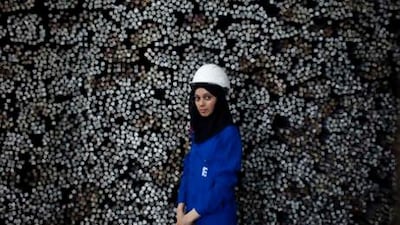MUSAFFAH // Mariam al Hammadi strides along a platform high above the floor of the Emirates Steel plant in Musaffah. With a vat of molten metal bubbling just below her, she explains how steel is formed.
"It's not easy," she concludes. "You also have to be patient." In her hard hat, work boots and blue coat, she is clearly marked as an employee of the plant, but she cannot help but stand out. At the age of 24, she is not only the first and only woman to work at the plant - the country's only integrated steel plant, which produces steel reinforcing bars - Emirates Steel believes she is the first Emirati woman to work in a steel factory. They even think she may be the first woman to do so in the region.
While most young working women spend their days in offices, Mrs al Hammadi toils for long hours in sweltering conditions. She cannot imagine being anywhere else. "It really is a nice job. The first time I walked into the steel plant, I liked it," she says. "I felt like there would be more innovation and creativity than other jobs." At first, Emirates Steel declined to hire Mrs al Hammadi, who graduated from UAE University in January with a degree in chemical engineering.
But, she persisted and was eventually taken on as a trainee supervisor to handle mechanical and metallurgical testing of steel bars that are widely used in the construction industry. Originally from Mirfa, in Al Gharbia, Mrs al Hammadi and her seven siblings grew up in Shamkha, a village on the outskirts of Abu Dhabi. Though her parents did not graduate from secondary school, they always encouraged their children to excel academically.
That encouragement continued when she decided to work at the steel plant. Her family and her husband, who works in the Armed Forces, were supportive of her unorthodox career path. "My husband supports me and knows I want to do this, so he pushes me forward," she says. While her family is behind her, Mrs al Hammadi hears the occasional comment that a woman should not be doing her job. Still, she says she feels accepted by most of her colleagues, all the more unlikely because of the rough-and-tough nature of steelworkers.
"We work as a team," she says. "It is challenging work and I am doing the same work as the men. Inside the mill there is no difference. They respect me and I respect them." She says would be happy to see more women join her on the factory floor. The company has more than 1,000 employees, over a quarter of them Emiratis. "I am encouraging people because you can do more innovation in this area and the work is very interesting and you have to think all the time," she says. "It's not just sitting back and relaxing. You have to search and find the solutions."
Mrs al Hammadi, who started working in late April, knows her way around the vast, maze-like factory. She routinely spends her entire day on the factory floor, where the workers have to deal with searing heat, the loud noise of steel production and a myriad of potential dangers. "You do feel tired and it can get hot," she says. "But when you are inside the plant you feel like you are a real engineer, you use your hands and your mind and are very involved."
She has tried her hand in every section in the plant, including the rolling mill, where the steel is compressed and the final product is produced. She also works inside the factory's laboratories, testing samples of the steel bars to ensure they are made to the right specifications. One day she would like to be a manager, but for the moment she is happy learning the ropes. "I want to know everything and start from the beginning," she says. "It's important if you work in any area you should know everything in that field. It is better to start from zero."
Claire Blakeborough, the associate director of Charterhouse Partnership, a recruitment firm in Dubai, says it is rare for Emirati women to opt for such careers. "In an industry which can be very male dominated, it is a big achievement for this lady to obtain this role," she says. Although Mrs al Hammadi is the only woman in the factory, Mahmood al Hameli, an Emirates Steel vice president, also stresses there are a number of Emirati female employees in "prominent positions" elsewhere in the company.
For her part, Mrs al Hammadi plays down her achievements, but is keen to be good role model for her son, Mohammed, 2. "I want my son to be proud of his mother and to see that she is the first woman to work in a steel plant," she says. "When he grows up I would like him to do whatever job he wants." @Email:zconstantine@thenational.ae

